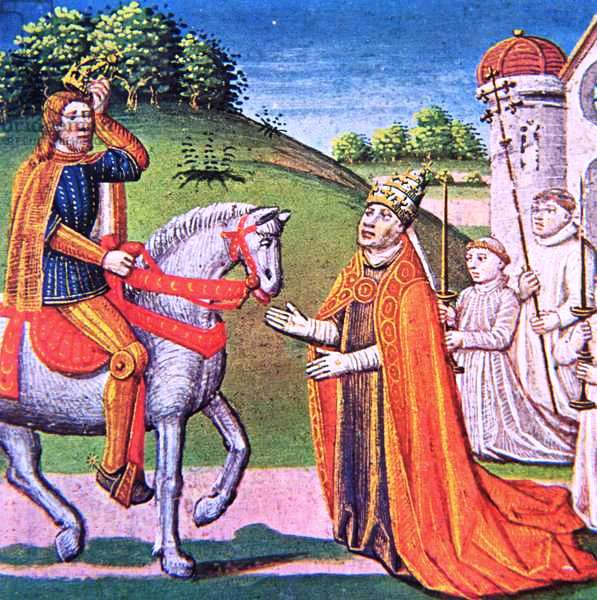Difference between revisions of "Adrian I (720-795)"
Tao alexis (talk | contribs) (Created page with "right|490px|thumb|Pope Adrian I meeting Charlemagne '''Adrian I''' (pope, 772-795) was born in 720 as a member of a noble Roman family. From the beginni...") |
Tao alexis (talk | contribs) m (Tao alexis moved page Adrian I to Adrian I (720-795)) |
||
| (One intermediate revision by the same user not shown) | |||
| Line 1: | Line 1: | ||
| − | [[File:Adrian I.jpg|right| | + | [[File:Adrian I.jpg|right|420px|thumb|Pope Adrian I meeting Charlemagne]] |
'''Adrian I''' (pope, 772-795) was born in 720 as a member of a noble Roman family. From the beginning of his pontificate he was forced by difficulties with the Lombards to invoke the aid of Charlemagne. This led to Charlemagne's Frankish invasion of Italy (774), overthrowing the Lombard kingdom in the north and incorporating it under his control. Charlemagne also renewed the alliance between the papacy and the Franks, confirming and augmenting the Donation of Pepin (providing a legal basis for the creation of the Papal States). | '''Adrian I''' (pope, 772-795) was born in 720 as a member of a noble Roman family. From the beginning of his pontificate he was forced by difficulties with the Lombards to invoke the aid of Charlemagne. This led to Charlemagne's Frankish invasion of Italy (774), overthrowing the Lombard kingdom in the north and incorporating it under his control. Charlemagne also renewed the alliance between the papacy and the Franks, confirming and augmenting the Donation of Pepin (providing a legal basis for the creation of the Papal States). | ||
Charlemagne let it be seen that he considered Rome a Frankish city, that he regarded the pope as his subject and that he believed that the Church should be Germanised. Adrian had to be content with the independence — somewhat more than nominal — which Charlemagne allowed. | Charlemagne let it be seen that he considered Rome a Frankish city, that he regarded the pope as his subject and that he believed that the Church should be Germanised. Adrian had to be content with the independence — somewhat more than nominal — which Charlemagne allowed. | ||
| − | After 780, Adrian dates his letters, not according to the reign of the Eastern emperor, but according to those of his own pontificate, and he began to coin money in his own name. | + | After 780, Adrian dates his letters, not according to the reign of the Eastern emperor, but according to those of his own pontificate, and he began to coin money in his own name. Adrian defended the decrees of the 2nd Ecumenical Council, held at Nicaea in 787, against their ill-considered rejection of Charlemagne. This long-lived pope was much beloved by the Romans because of his care of the churches of the city and his charity to the afflicted. |
| + | |||
| + | [[Category: Historical Persons]][[Category: Religious Leaders]] | ||
Latest revision as of 18:15, 11 May 2023
Adrian I (pope, 772-795) was born in 720 as a member of a noble Roman family. From the beginning of his pontificate he was forced by difficulties with the Lombards to invoke the aid of Charlemagne. This led to Charlemagne's Frankish invasion of Italy (774), overthrowing the Lombard kingdom in the north and incorporating it under his control. Charlemagne also renewed the alliance between the papacy and the Franks, confirming and augmenting the Donation of Pepin (providing a legal basis for the creation of the Papal States).
Charlemagne let it be seen that he considered Rome a Frankish city, that he regarded the pope as his subject and that he believed that the Church should be Germanised. Adrian had to be content with the independence — somewhat more than nominal — which Charlemagne allowed.
After 780, Adrian dates his letters, not according to the reign of the Eastern emperor, but according to those of his own pontificate, and he began to coin money in his own name. Adrian defended the decrees of the 2nd Ecumenical Council, held at Nicaea in 787, against their ill-considered rejection of Charlemagne. This long-lived pope was much beloved by the Romans because of his care of the churches of the city and his charity to the afflicted.
